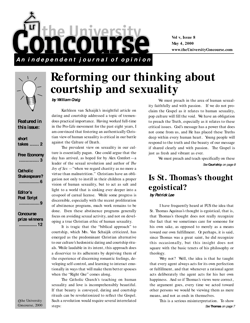Charity may be severe
by Kathleen van Schaijik
Five years of work on the Concourse has taught me that this point cannot be stressed enough (given that we’ve all grown up breathing the poisonous gas of pop psychology): There is no essential conflict between criticism and charity—even between very harsh criticism and charity. If there were, we would have to say that Love Incarnate was being uncharitable when he called the Pharisees “snakes” and “vipers’ brood,” or St. Paul was being uncharitable when he called some of the early Christians “fools.”
The beneficence of our criticism is not measured by its mildness, but rather by its intention and its justice. Is it directed at the good? Is it true? These are the questions we should be asking about criticism that comes our way, not “Was it pleasant to hear?” “Was it sandwiched in praise?”
Just try to imagine Jesus following the conventional wisdom about “constructive criticism”: “I really want to commend and honor you Pharisees for your zeal; I’m just suggesting that there might be some room for improvement in this one area. There’s no question that you have a valid point when you stress the importance of keeping the Sabbath; definitely, we need to keep the Sabbath; I’m just saying maybe if you expressed your concern differently it might be more effective. But, in any case, I really want to affirm you for your great leadership of the Jewish people.”


